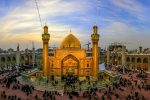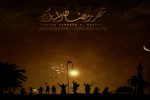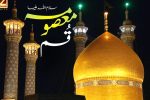Feeling the Presence of Imam Mahdi (a.t.f.s.)
Imam al-Asr (a.t.f.s.) is attentive towards all the believersOn the basis of traditions, Shias believe that Imam al-Asr (a.t.f.s.) is aware of all actions and conditions of Allah’s creatures, whether they are on the earth, in the skies, in the solar system or any other part of the universe. And out of everything he observes, […]

Imam al-Asr (a.t.f.s.) is attentive towards all the believers
On the basis of traditions, Shias believe that Imam al-Asr (a.t.f.s.) is aware of all actions and conditions of Allah’s creatures, whether they are on the earth, in the skies, in the solar system or any other part of the universe. And out of everything he observes, he has special attention and consideration towards the believers. This is evident from the incident outlined below that highlights the concern of the Imam (a.s.) towards his Shias.
Ramila says: I became very sick during the reign of Ameerul Mo’mineen (a.s.). On Friday, I felt a little relief. I said to myself that the best thing to do was to sprinkle a little water on my face and go and pray behind Ameerul Mo’mineen (a.s.). So I went to the mosque. When Imam (a.s.) went on the pulpit, my condition worsened again. When Imam (a.s.) returned from the mosque and entered a place called ‘Qasr’ I entered along with him. He turned towards me and said: O Ramila I saw that you were uneasy. I replied: Yes and revealed my illness and explained my objective of attending the prayer. Imam(a.s.) declared: ‘O Ramila, no believer becomes ill except that we also fall ill due to his illness and he does not become sorrowful that we also become sorrowful due to his sorrow. And he does not pray except that we say Amin to his supplication. And when he remains silent we pray for him.
I said: O Amirul Mo’mineen! May I be sacrificed upon you. Whether this is also concerning those believers who are in قصر? What about those who are around the earth? He said: ‘O Ramila! No believer in the east or west of the earth remains concealed from us.’1
What can be more fortunate for a Shia than to have such an Imam? Then what is more beneficial for him that he prays for the hastening of reappearance and surrenders his desires to Imam (a.t.f.s.). Imam al-Asr (a.t.f.s.) is nobler than this that his Shia remembers him, while he himself neglects him. Imam (a.t.f.s.) wrote to Sheikh Mufid (r.a.): ‘We are aware of everything that happens to you, and your information is never hidden from us. We are not negligent about looking after you and we do not forget your remembrance.2
From the above letter, it is apparent that although Imam (a.t.f.s.) is hidden from the eyes of the people, the actions of the people are not concealed from his vision. He is aware of the conditions of the people in east and the west and with regards to the believers, he pays special attention.
In fact , it mea ns that while he is identity is not apparent to the people, he witnesses all the people – their bodies and souls, in such a way that nothing from the apparent or unseen is hidden from his eyes and no one is beyond his domain.
As we recite in ziyarat on Friday: ‘Peace be upon you, O eye of Allah amongst His creation’.3
In light of the above, how can one conclude that he is not aware of the condition of Allah’s servants?
The important thing here is that man should realize the reality of this fact and should feel the presence of Imam’s (a.t.f.s.) holy existence everywhere, at all times. In this situation, for him occultation is tantamount to witnessing Imam (a.t.f.s.) and he always feels Imam’s (a.t.f.s.) presence. Then such a person will sincerely and genuinely try to observe the respect and honour towards his Imam’s (a.t.f.s.) existence. And by this, he will embrace the path of certainty in the period of Imam’s (a.t.f.s.) occultation. For experiencing such a condition (i.e. feeling presence of Imam al-Ghaib (a.t.f.s.)), there is only one way and this is evident from the tradition of Imam Sajjad (a.s.) to Abu Khalid: ‘O Abu Khalid, certainly the people of the time of His (Imam Mahdi ((a.t.f.s.)) occultation who believe in his Imamat and are awaiting his reappearance are better than the people of all times. This is because Allah has given them such intelligence understanding and recognition that occultation for them has become akin to his presence.’4
Yes, achieving this condition is possible through a deeper and a more perfect sense of recognition of all fundamentals of religion. The base and the root of every recognition is recognition of Allah, which man must realize. If man is able to realise Allah’s Unity (Tauheed) as is outlined in traditions, his actions and behaviour will automatically fall in line with Allah’s wishes. Similarly, the recognition of Prophethood and Imamat should be correct, i.e. it should be in conformity with the Quran and traditions, without any reliance on one’s own intellect and rationale. Amongst all these beliefs, recognition of Imamat possesses special importance.
In addition to correct beliefs, actions also play a crucial role in acquiring certainty. Actions are equally essential and are a sign of Imam’s (a.t.f.s.) recognition and therefore should be pursued with more efforts. Gradually more and more similarity will be found between the Imam(a.s.) and the follower. This spiritual similarity will prepare the ground for feeling the presence of Imam al-Ghaib (a.t.f.s.) at all times as outlined in Imam Sajjad ‘s (a.s.) tradition to Abu Khalid.
At times Imams (a.s.) used to lift the veil of the unseen and manifest the reality to the Shias so that they may realise the concept. Abu Basir (r.a.) quotes: I entered the mosque along with Imam Baqir (a.s.), while people were entering and leaving. Imam (a.s.) said to me, ‘Ask the people whether they are able to see me?’ Then whoever passed from there I asked him: ‘Do you see Imam Baqir (a.s.)?’ He used to reply in the negative while he was standing right beside me. Abu Haroon who was blind entered the masjid. Imam (a.s.) said: ‘Ask him.’ I said: ‘Did you not see Imam Baqir (a.s.)?’ He said: ‘Is he not standing here?’ I inquired: ‘How did you come to know?’ He replied: ‘How would I not know while he is a shining light?’
Abu Basir (r.a.) narrates: ‘I heard Imam (a.s.) conversing with a man from Africa – How is Rashid? The African replied: ‘I left him alive, while he had correct belief and he has conveyed salam to you.’ Imam (a.s.) said: ‘May Allah have mercy upon him!’ The African asked, ‘Did Rashid pass away? Imam (a.s.) said: ‘Yes’ He asked: ‘When?’ Imam (a.s.) said: ‘Two days after you left.’ He said: ‘I swear by Allah, Rashid was not sick nor was he in any sort of trouble and a man usually dies under the effect of sickness or disease.’ I (Abu Basir) asked: ‘Who was this person?’ Imam (a.s.) said: ‘He was one with my Mastership and love.’ Then Imam (a.s.) asserted: ‘If you think that I am not seeing you and hearing you then you have imagined wrongly. I swear by Allah, none of your actions are hidden from us. Therefore always consider me present5 and make yourself habituated to good work and be from the good doers so that you are known by it. I recommend this to my children and my Shias.’6
Yes, it is possible that a blind person feels the presence of his Imam (a.s.) while a person with eyes is unable to see him. Imam (a.t.f.s.) is a brilliant light and seeing him is not dependent upon the apparent eyes. If a person’s heart sees, he will be able to see Imam (a.t.f.s.) and feel his presence.
What is important is a spiritual bond and communication between us and Imam’s (a.t.f.s.) holy existence. Imam Baqir (a.s.) has guided us towards this spiritual bond by recommending that we always feel the presence of our Imam and try to do good deeds so as to be habituated to goodness and perform it consistently so that we are recognised with piety and associated with virtue.
References:
1. Basair-ud-Darajaat, Chap. 16, Tradition 1
2. Ihtejaj al-Tabarsi, Vol. 2, Pg. 323
3. Bihar al-Anwar, Vol. 2 Pg. 215
4. Kamaluddin, Chap. 31, Tradition 2
5. It obviously means: consider me present and feel my presence.
6. Al Kharaaej al-Qutb al-Rawandi, Pg. 92
Source: www.alhassanain.org/egnlish
این مطلب بدون برچسب می باشد.










Leave a Reply